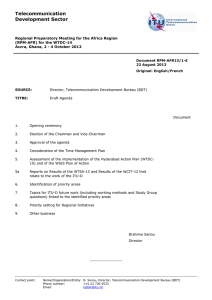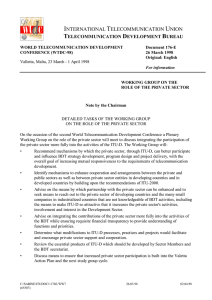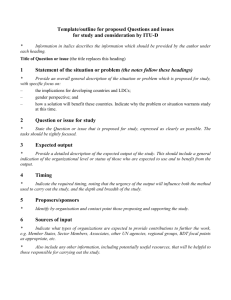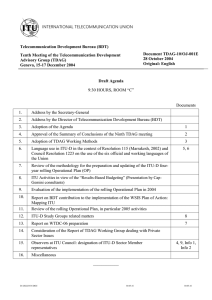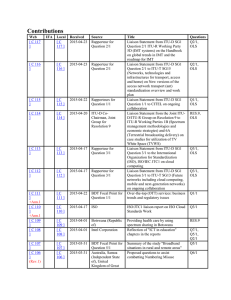I T U D
advertisement
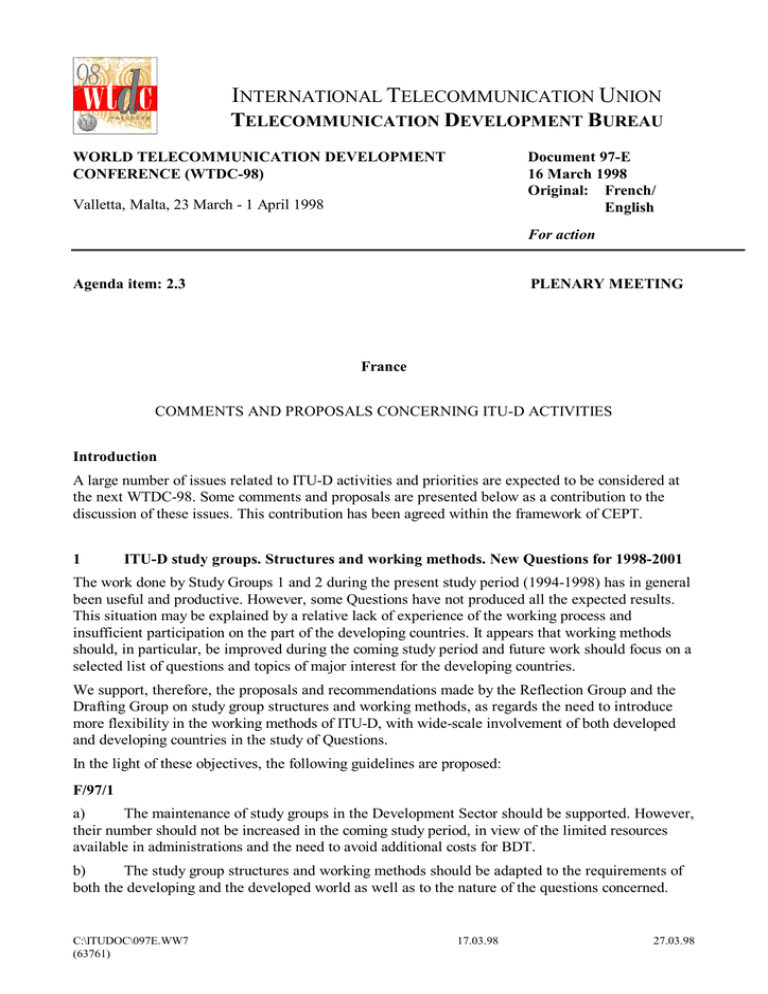
I NTERNATIONAL TELECOMMUNICATION UNION TELECOMMUNICATION DEVELOPMENT BUREAU Document 97-E 16 March 1998 Original: French/ English WORLD TELECOMMUNICATION DEVELOPMENT CONFERENCE (WTDC-98) Valletta, Malta, 23 March - 1 April 1998 For action Agenda item: 2.3 PLENARY MEETING France COMMENTS AND PROPOSALS CONCERNING ITU-D ACTIVITIES Introduction A large number of issues related to ITU-D activities and priorities are expected to be considered at the next WTDC-98. Some comments and proposals are presented below as a contribution to the discussion of these issues. This contribution has been agreed within the framework of CEPT. 1 ITU-D study groups. Structures and working methods. New Questions for 1998-2001 The work done by Study Groups 1 and 2 during the present study period (1994-1998) has in general been useful and productive. However, some Questions have not produced all the expected results. This situation may be explained by a relative lack of experience of the working process and insufficient participation on the part of the developing countries. It appears that working methods should, in particular, be improved during the coming study period and future work should focus on a selected list of questions and topics of major interest for the developing countries. We support, therefore, the proposals and recommendations made by the Reflection Group and the Drafting Group on study group structures and working methods, as regards the need to introduce more flexibility in the working methods of ITU-D, with wide-scale involvement of both developed and developing countries in the study of Questions. In the light of these objectives, the following guidelines are proposed: F/97/1 a) The maintenance of study groups in the Development Sector should be supported. However, their number should not be increased in the coming study period, in view of the limited resources available in administrations and the need to avoid additional costs for BDT. b) The study group structures and working methods should be adapted to the requirements of both the developing and the developed world as well as to the nature of the questions concerned. C:\ITUDOC\097E.WW7 (63761) 17.03.98 27.03.98 -2CMDT98/97-E In this context, greater flexibility should be given to the study groups for establishing working groups, focus groups or rapporteur groups as appropriate. Within the rapporteur groups, the procedure of "working par correspondence" should be developed, with the use of electronic media for quick document transfer, due account being taken of appropriate tools available, in particular in developing countries. Meetings of rapporteur groups or focus groups should be planned in advance, in case background documents or reports have to be developed. More documents should be made available on ITU's Web site, but traditional means of delivery should be kept for Member States or Sector Members that request them. Coordination between rapporteurs involved in interacting topics should be better defined and ensured. The BDT Secretariat should play a more active role in this respect, in collecting and filtering the output of different international organizations, such as, at the European level, the European Commission and CEPT as regards questions dealing with regulatory aspects. Regarding technical questions, liaison with the other two Sectors should be improved, as adequate know-how is already available. c) The Questions to be studied during the coming period (1998-2001) should be limited to a reasonable number and relative priorities should be set in accordance with the functions of ITU-D and the draft Strategic Plan. The list of proposed new Questions drawn up by TDAB is, in general, acceptable but needs further consideration, given that some Questions could be allocated as "study cases or issues" to BDT and made the subject of a report to the study group concerned for information or endorsement only. Duplication should be avoided with work already undertaken in the other two Sectors. Regular reports on the work in progress in the study groups and on the results achieved should be issued by the study group management and distributed by BDT. In order to encourage more active participation by developing countries in the work of Sector study groups, greater importance should be given to the regional dimension of ITU-D, by means of regional rapporteur groups, or collaboration with ITU regional offices and regional organizations. Regional rapporteur groups would allow region-specific issues to be addressed without the need to travel to Geneva. Good liaison would be necessary between groups and organizations dealing with similar issues. 2 Role of the Development Sector. Possible priorities for the future "Valletta Action Plan" (as a follow-up to the Buenos Aires Action Plan) F/97/2 a) The Director of BDT should provide appropriate information on the implementation of "the Buenos Aires Action Plan" (1994-1997) and the related costs incurred as well as difficulties encountered. b) It is proposed that WTDC-98 establish priorities for ITU-D in order for them to be reflected in the draft Strategic Plan, which should clearly state the tasks and priorities of the Sector. The implementation of activities and programmes, as established by WTDC-98, should be conducted in close liaison with the work to be carried out in ITU-T and ITU-R, due regard being paid to the necessary complementarity among ITU Sectors and the need for transparency. C:\ITUDOC\097E.WW7 (63761) 17.03.98 27.03.98 -3CMDT98/97-E c) The Director of BDT should also develop an appropriate operational and financial plan for ITU-D, in particular for the implementation of the proposed "Valletta Action Plan", with clear evaluation of the budgetary implications. d) As an input to the "Valletta Action Plan" several proposed priorities were defined at regional level during the regional conferences, in the framework of the proposed overall follow-up to the Buenos Aires Action Plan. • Programme 1: Sector reform, regulation and legislation; • Programme 2: Technologies and GII development and applications (including GMPCS and Internet); • Programme 3: Rural development and universal access to basic telecommunication services; • Programme 4: Finance and economics (including tariff rebalancing and cost models); • Programme 5: Private sector development and partnerships; • Programme 6: Human resources development and management, with a focus on using computer-based training, teletraining, group training. When establishing these programmes and their priority, account should be taken of the fact that it is now crucial for ITU to focus its efforts on assisting Member States, in particular developing counties, in preparing for the changes in the regulatory and commercial environment. e) The tasks of ITU-D could also include the improvement of human development indicators, as telecommunication development should contribute, inter alia, to the improvement of national GDP and health and education indicators. f) From a strategic point of view, the concept of "long-term strategic partnership" should be developed and exploited with the use of different alternative possibilities - BDT and regional organizations, public and private sector. The respective advantages of these possibilities should be carefully evaluated. g) The possible involvement of NGOs should be given further consideration, as this might be cost-effective, for instance in the context of multipurpose community telecentres. h) In general, direct ITU assistance should concentrate on countries where domestic resources and private flows are not sufficient. The least developed countries (LDCs) should be the main target, subject to later evaluation of results achieved to ensure that the funds available are used in an efficient way. However, before any concrete programme is approved for these countries, careful consideration should be given to resource availability, and especially to the feasibility of a separate budget, and to the use of telecom surplus funds (Recommendation 10 of the Reflection Group). i) A methodology for evaluation of action taken should be applied, comparing results both with objectives previously set in the "Valletta Action Plan" and with the resources allocated. TDAB, within its possible new organizational framework, should assist in this evaluation, taking into account the methodology already used in other Sectors, in particular ITU-R. _____________ C:\ITUDOC\097E.WW7 (63761) 17.03.98 27.03.98
